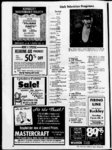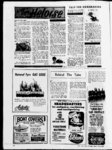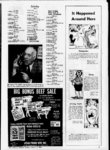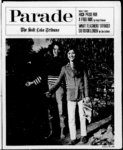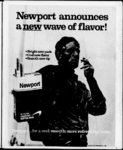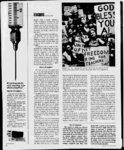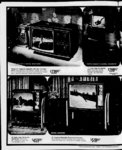| OCR Text |
Show The Presidential Appeals Board: from left. Judge Henry J. Cwiazda, attorney Charles N. Collatos. and Dr. Kenneth VV. Clement. "So many young men are unaware they can appeal to our board." by JAMES P. SNYDER and ROBERT WASHINGTON, A 4 HICKOX D.C. authority to determine for hundreds of young Presidential is vested in three men, whose decisions carry the finality of Supreme Court rulings. Yet, despite their heavy responsieffects bility and the often of their judgments, all three are virtually unknown to most of the nation. These three men Henry J. Cwiazda. Charles N. Collatos, and Dr. Kenneth W. Clement gather behind the closed doors of a small, nondescript government office a block from the White House to adjudicate 200 cases a month. Neither their names nor their photos would prompt a flicker of recognition from the public or, for that matter, from the Washington press corps. A Connecticut probite judge, a Boston lawyer, and a Cleveland doctor, they spend most of their time attending to their private vocations. But twice a month, each flies into Washington with locked attache cases filled with confidential males. case histories of draft-ag- e The Selective Service System enters a young man's life at 18 and remains a pervasive influence until he either fuln fills his or is found unsuitable for the armed forces. For the majority who must eventually serve, the timing of their induction can be crucial. Whether many of them are classified or are granted one of more than a dozen deferment classifications largely depends on the opinions of three Presidential appointees. As the National Selective Service Appeals Board, or the Presidential Appeals Board, they are the final arbiters on draft classification appeals. There is no further appeal from their decision. Though the board was created by the military-obligatio- F. 78th Congress in 1940, it was not until the draft was reactivated in 1948 that President Truman established its present civilian tone, with full Presidential power to determine all draft classification claims. During World War II, the board was, in effect, a military tribunal officers attached comprising active-dut- y to the Selective Service headquarters. Today, the only connection the board has with Gen. Lewis B. Hershey, Selective Service director, is the fact that it meets in a room one floor below Hershey's office and shares mutual information with his administrators. The appointments to the Presidential Appeals Board are theoretically permanent. Since 1948, only nine members, including the three incumbents, have served; two died in office and four others resigned. Simple procedure the board is almost 29 years old, why then is so little known about its functions and its members? "It's really puzzling," says Chairman Gwiazda, a tanned probate judge, and a member since 1 961 , "We find so many young men who are intensely concerned over the draft and yet are totally unaware they can appeal their classifications to the President through our board. We're not trying to encourage or discourage Presidential appeals. We'd just like to be sure every youngster is fully aware of his rights under the law." Attorney Collatos asserts, "The procedure for appeals hrs purposely been kept simple. It's not like a civil court appeal, where the appellant must engage a lawyer. All he has to do is write 'I want to appeal,' list his Selective Service number and sign his name. In fact, any If one of his dependents or his employer can do it for him." Anyone can appeal a local board's classification to his State Board of Appeals within 30 days after he is notified. He need not state any reason for his appeal. If the state board hands down a split decision, he can appeal directly to the Presidential Appeals Board. If the state board's action is unanimous, the individual can make no further appeal on his own. But either the state Selective Service director or Gen. Hershey can take the appeal directly to the Presidential board. Dr. Clement, a tall, surgeon with neatly trimmed, graying sideburns, explained the board's role. "We base our judgments solely on the written record," he says. "There are no personal appearances before this .board." The case histories are prepared by the e board's executive aide and mailed to the members' homes at least three weeks before the board convenes in Washington. The members have already analyzed the cases and made their decisions at home before they sit down in Washington to vote. A vote decides each appeal, although Gwiazda says "more than 75 percent of our decisions are unanimous." Gwiazda, Clement and Collatos are casting their votes on draft eligibility at a point in the nation's history when its involvement in war is being met with unprecedented opposition. News analyst Stewart Alsop recently stated: "No doubt ideology and honest idealism play a part in the passionate opposition to the war among the college-educate- d young. But the draft supplies the passion. The young men who demonstrate full-tim- two-thir- ds against the war passionately do not want to be drafted." The draft card burners, the demonstrators who march across campuses to the strident chorus of "Hell No, We Won't Go" and the evaders who seek haven in Canada what effect have they had on the judgments of the Presidential board? "None whatsoever," says Dr. Clement. "Whatever our personal feelings may be, the board does not judge their conduct; there is nothing punitive in our decisions. Our responsibility lies solely in determining whether they have been given the correct classification. Collatos, who served throughout Europe from 1941 to 1945 with an airborne division, insists the student protests "are confined to small, but vocal minorities." Gwiazda feels "the percentage of people dissenting, as indicated by the rate of appeals, is the same as it was during the Korean conflict when there were no such demonstrations." The Presidential Appeals Board handled a total of 4764 cases during 1951, '52 and the first six months of '53. From 1965 through 1967, it received 3894 appeals. The total number of Selective Service registrants has increased since 1965 by more than 6 million young men. "Yet, the number of college deferments has declined during the same period by 657," says Gwiazda. "While many of these kids may not be in favor of the draft, they're not shirking it." Proven ability This interest in the nation's youth is undoubtedly a main reason for their appointments to the board. Proven leadership and the ability to make sound judgments are other factors. Dr. Clement is a leader among the Negro community of Cleveland and was one of the chief strategists behind the 1967 election of Carl Stokes as the city's first Negro mayor. His judgment is tested every time he enters an operating room. Gwiazda has been a probate judge in Connecticut since 1955 and is a former two-termayor of his native New Britain, Conn. Collatos, 51, is the Massachusetts Commissioner of Veterans Services, an obvious qualification. In addition, all three Gwiazda are veterans themselves. served with an armored unit during World War II and Dr. Clement was a flight surgeon during the Korean conm flict. Each man spends about 50 hours a month on his "homework," in addition to two full days in Washington. His per diem compensation amounts to about $50, considerably less than the earnings of a congressional committee aide. Without a trace of recognition, much less a slice of fame, which generally accompanies a Presidential appointment, why would three successful, established professional men agree to serve? "When the President invites you to dinner, you don't tell him your wife has a cold," says Gwiazda smiling. PARADfc JANUARY 26, 1S |


































































































































